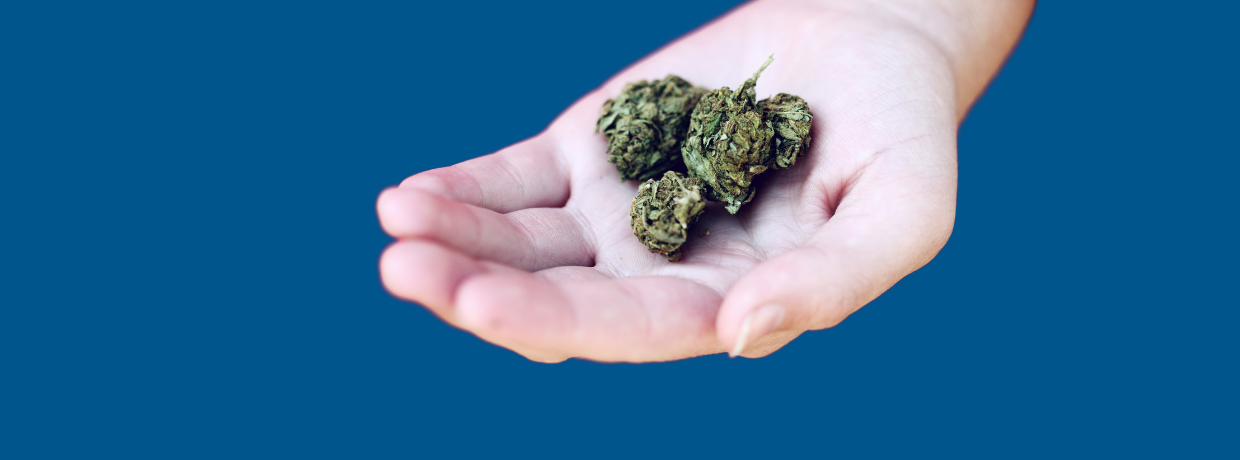 Free shipping on all orders over $60
Free shipping on all orders over $60 
With more and more research being done on cannabis and hemp derivatives, cannabis users become increasingly curious about different compounds in the cannabis plant. In this article, we will cover the effects of the cannabinoid THC-B, its legal status and…
With more and more research being done on cannabis and hemp derivatives, cannabis users become increasingly curious about different compounds in the cannabis plant. In this article, we will cover the effects of the cannabinoid THC-B, its legal status and the potential benefits and side effects of using this abundant psychoactive cannabinoid.
THC-B, or tetrahydrocannabutol is a naturally occurring psychoactive cannabinoid found in marijuana plants. It is only available in small quantities, accounting for less than 1% of the cannabis plant’s chemical composition. Therefore, until it was synthesised in the lab, it was quite difficult to study and research its analgesic properties.
THC-B molecular structure is similar to delta-9 THC, which is a main psychoactive compound found in a hemp plant. The difference between them is that delta-9 THC has 5 carbon atoms (a pentyl chain) THC-B has 4 carbon atoms (a butyl side chain). This difference changes the way THC-B interacts with the endocannabinoid receptors. Some researchers believe that it has a stronger binding affinity to endo-cannabinoid receptors than delta-9 THC, and potentially has a stronger psychoactive effect.
THC-B is one of the psychoactive cannabinoids and like THC and THC-P, it can produce psychoactive effects. Even though there is not a lot of research done, it is believed that it is about as strong as THC. THC-B’s psychoactive effects are attributed to the interaction of CB1 and CB2 cannabinoid receptors in the human central nervous system. While it is similar to THC and can potentially have a stronger binding affinity, there is still a lot of research to be done to understand how they compare to each other.
There is still a lot of room for research on the potential therapeutic benefits of THC-B. Preliminary studies and anecdotal research suggest that THCB products could have strong pain relief and analgesic properties. The analgesic effects could be extremely helpful for people suffering from chronic pain without the side effects of conventional pain relief medications. Because it is so similar to THC, it may also have anti-inflammatory properties.
As with any psychoactive substance, THC-B carries a certain risk for negative side effects. Because it is still under-researched, it is important to use it very carefully. More studies are needed to understand short-term and long-term effects.
Drug tests are screening for the psychoactive ingredient THC, and most drug tests don’t exclude other cannabinoids. THC-B chemical composition is very similar to THC so there is a chance that if you consume THC-B, it might lead to a positive drug test result.
To not fail a drug test, our recommendation is not to use THC-B or other popular cannabinoids for at least 3 weeks before the drug test. If you use cannabis plant or hemp derivatives regularly for a long time, it will take longer to get it out of your system, so be mindful about taking it if you think you may need to do a drug test.
The first state to legalise medical use of cannabis plants was California in 1996. Now the medical use of the cannabis plant is legalised in 40 states. Medical or recreational use of the cannabis plant has been approved in 24 states and the district of Columbia.
However, the legal status of THCB products is a grey area. The United States Farm Bill in 2018 legalised the cultivation of medicinal cannabis sativa variety plants and its derivatives, as long as the marijuana products have >0.3% THC. This means that THC-B products can be considered legal as long as it has less than 0.3% of delta-9 THC, however, individual states might ban the use of THC-B, so check your local laws before purchasing any THC-B products.
The main difference is the side chain length; THCB has a butyl side chain while THC has a pentyl side chain. This difference may affect the potency and the way THCB interacts with cannabinoid receptors, potentially making it more potent in some aspects.
While THCB is a promising cannabinoid that may be stronger than THC in terms of psychoactive effects due to its higher binding affinity to CB1 receptors, much more research is needed to fully understand its potency, effects, and potential medical benefits. As with any cannabinoid, individual responses can vary, and further studies will help clarify the full spectrum of its properties and applications.
Given the current lack of comprehensive research, the safety profile of THCB is not well understood. While its structural similarity to THC suggests it might have similar effects and risks, the potentially stronger binding to CB1 receptors could mean more intense effects and side effects. Until more research is available, it is advisable to approach THCB with caution, use it in moderation, and consult with healthcare professionals.
There is no existing research on the effects of THCB. However, the scientists who discovered it suggest that it may have similar anti-inflammatory, pain-relieving, and insomnia-combatting properties to THC. It is currently unknown whether THCB is more potent than THC.
Major gaps include the lack of comprehensive studies on its effects, safety, therapeutic potential, and long-term health impacts. Future research should focus on clinical trials to assess its safety and efficacy, studies on its pharmacokinetics and pharmacodynamics, and potential therapeutic applications.